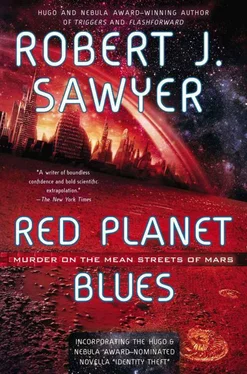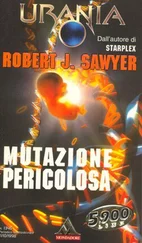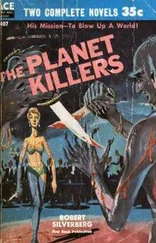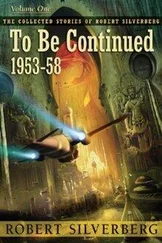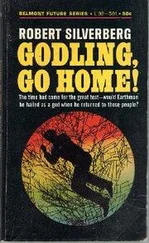Robert J. Sawyer
RED PLANET BLUES
There are strange things done ’neath the Martian sun
By those who seek the mother lode;
The ruddy trails have their secret tales
That would make your blood run cold;
The twin moonlights have seen queer sights,
But the queerest they ever did see
Was that night on the shore of a lake of yore
I terminated a transferee.
In February 2004, Hugo Award–winning author Mike Resnickapproached me with an offer I couldn’t refuse: write a “science-fictional hard-boiled private-eye novella” for an original anthology he was editing for the Science Fiction Book Club called Down These Dark Spaceways.
That story, “Identity Theft,” went on to win Spain’s Premio UPC de Ciencia Ficción, which, at 6,000 euros, is the world’s largest cash prize for science-fiction writing. It was also a finalist for the Canadian Science Fiction and Fantasy Award (“the Aurora”), as well as for the top two awards in the science-fiction field: the World Science Fiction Society’s Hugo Award (SF’s “People’s Choice Award”) and the Science Fiction and Fantasy Writers of America’s Nebula Award (SF’s “Academy Award”)—making “Identity Theft” the first (and so far only) original publication of the SFBC ever to be nominated for either of those awards. In a slightly modified form, “Identity Theft” makes up the first ten chapters of this novel.
In 2007, my wife Carolyn and I spent the summer at Berton House, the former home of Canadian historian and author Pierre Berton. One of Canada’s most prestigious writers’ residencies, Berton House is in Dawson City in the Yukon Territory—the heart of the Klondike Gold Rush. Although I’d already established the Great Martian Fossil Rush as the backstory to “Identity Theft,” it was my time in the Yukon—living across the dirt road from Robert Service’s cabin, and just a block from Jack London’s old home—that made me want to really explore the madness and greed that drives stampedes of prospectors. My thanks to the Berton House administrator Elsa Franklin, and to Dan Davidsonand Suzanne Saito, who looked after us in Dawson City.
For other help and encouragement, my thanks go to Ted Bleaney, Wayne Brown, David Livingstone Clink, Paddy Forde, Marcel Gagné, James Alan Gardner, Martin H. Greenberg, John Helfers, Doug Herrington, Al Katerinsky, Herb Kauderer, Geoffrey A. Landis, Kirstin Morrell, Kayla Nielsen, Virginia O’Dine, Ian Pedoe, Sherry Peters, and Alan B. Sawyer.
My working title for this book was The Great Martian Fossil Rush, but my American publisher wanted something that played up the noir angle. I asked for suggestions online, and hundreds of possibilities were put forth. Jeffrey Allan Beeler, Nazrat Durand, André Peloquin, and Mike Pooleeach separately proposed the title we ended up using, Red Planet Blues. My thanks to them, and to the more than one hundred other people who made suggestions. As it happens, the same title was used in 1989 by my great friend Hugo Award–winning writer Allen Steelefor a novella he later incorporated into his terrific 1992 Mars novel Labyrinth of Night; I’m using the title with Allen’s kind permission.
Finally, huge thanks, as always, to the Aurora Award–winning poet Carolyn Clink, who helped in countless ways; to my father John A. Sawyer, who encouraged my early interests in both paleontology and other worlds; to Adrienne Kerrat Penguin Group (Canada) in Toronto; and to Ginjer Buchananat Penguin Group (USA)’s Ace imprint in New York. And, of course, many thanks to my agents Christopher Lotts, Vince Gerardis, and the late Ralph Vicinanza.
ONE

The door to my office slid open. “Hello,” I said, rising from my chair. “You must be my nine o’clock.” I said it as if I had a ten o’clock and an eleven o’clock, but I didn’t. The whole Martian economy was in a slump, and even though I was the only private detective on Mars this was the first new case I’d had in weeks.
“Yes,” said a high, feminine voice. “I’m Cassandra Wilkins.”
I let my eyes rove up and down her body. It was very good work; I wondered if she’d had quite so perfect a figure before transferring. People usually ordered replacement bodies that, at least in broad strokes, resembled their originals, but few could resist improving them. Men got more buff, women got curvier, and everyone modified their faces, removing asymmetries, wrinkles, and imperfections. If I ever transferred myself, I’d eliminate the gray in my blond hair and get a new nose that would look like my current one had before it’d been broken a couple of times.
“A pleasure to meet you, Ms. Wilkins,” I said. “I’m Alexander Lomax. Please have a seat.”
She was a little thing, no more than 150 centimeters, and she was wearing a stylish silver-gray blouse and skirt but no makeup or jewelry. I’d expected her to sit with a fluid catlike movement, given her delicate features, but she just sort of plunked herself into the chair. “Thanks,” she said. “I do hope you can help me, Mr. Lomax. I really do.”
Rather than immediately sitting down myself, I went to the coffeemaker. I filled my own mug, then offered Cassandra one; most models of transfer could eat and drink in order to be sociable, but she declined my offer. “What seems to be the problem?” I said, returning to my chair.
It’s hard reading a transfer’s expression: the facial sculpting was usually excellent, but the movements were somewhat restrained. “My husband—oh, my goodness, Mr. Lomax, I hate to even say this!” She looked down at her hands. “My husband… he’s disappeared.”
I raised my eyebrows; it was pretty damned difficult for someone to disappear here. New Klondike was locked under a shallow dome four kilometers in diameter and just twenty meters high at the central support column. “When did you last see him?”
“Three days ago.”
My office was small, but it did have a window. Through it, I could see the crumbling building next door and one of the gently sloping arches that helped hold up the transparent dome. Outside the dome, a dust storm was raging, orange clouds obscuring the sun. Auxiliary lights on the arch compensated for that, but Martian daylight was never very bright. “Is your husband, um, like you?” I asked.
She nodded. “Oh, yes. We both came here looking to make our fortune, just like everyone else.”
I shook my head. “I mean is he also a transfer?”
“Oh, sorry. Yes, he is. In fact, we both just transferred.”
“It’s an expensive procedure,” I said. “Could he have been skipping out on paying for it?”
Cassandra shook her head. “No, no. Joshua found one or two nice specimens early on. He used the money from selling those pieces to buy the NewYou franchise here. That’s where we met—after I threw in the towel on sifting dirt, I got a job in sales there. Anyway, of course, we both got to transfer at cost.” She was actually wringing her synthetic hands. “Oh, Mr. Lomax, please help me! I don’t know what I’m going to do without my Joshua!”
Читать дальше
